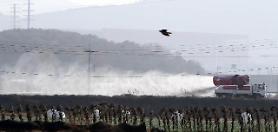![Migratory birds observed in Cheonsu Bay on Oct. 13. [Photo=Seosan City]](https://image.ajunews.com/content/image/2025/11/21/20251121150431193548.jpg)
SEOUL, November 21 (AJP) - South Korea is tightening biosecurity controls at poultry farms across the country as cases of highly pathogenic avian influenza continue to rise, fueled by a seasonal influx of migratory birds and the spread of multiple virus serotypes.
The Central Accident Management Headquarters said Friday that six cases of highly pathogenic avian influenza have been confirmed at domestic poultry farms this year, along with 10 cases detected in wild birds.
The first outbreak was reported in September at a native chicken farm in Paju, north of Seoul, with four additional farm cases and seven wild bird infections recorded in November alone.
Authorities say the surge in migratory birds is amplifying the threat. The Ministry of Environment reported that roughly 1.33 million migratory birds were observed at 200 sites nationwide in November — a 111 percent increase from the previous month.
Environmental samples collected near farms and major waterways in Gyeonggi and North Jeolla provinces tested positive for H5 antigens, pointing to significant contamination near poultry production zones. For the first time, South Korea has also detected H5N1, H5N6 and H5N9 strains in wild birds this year.
In response, the government plans to expand the number of rented disinfection vehicles from 39 to 135, targeting areas with dense poultry populations and migratory bird habitats. Special inspections will be carried out in 27 cities and counties with a history of outbreaks, and tighter controls will be imposed on spent hen shipments and the movement of egg transport vehicles.
Lee Dong-sik, director of the Agriculture Ministry’s Quarantine Policy Bureau, urged local governments to rigorously enforce on-farm biosecurity and to strengthen education efforts. He stressed that farmers must remain vigilant and adhere to self-disinfection protocols to reduce the risk of further spread.
* This article, published by Aju Business Daily, was translated by AI and edited by AJP.
Copyright ⓒ Aju Press All rights reserved.



